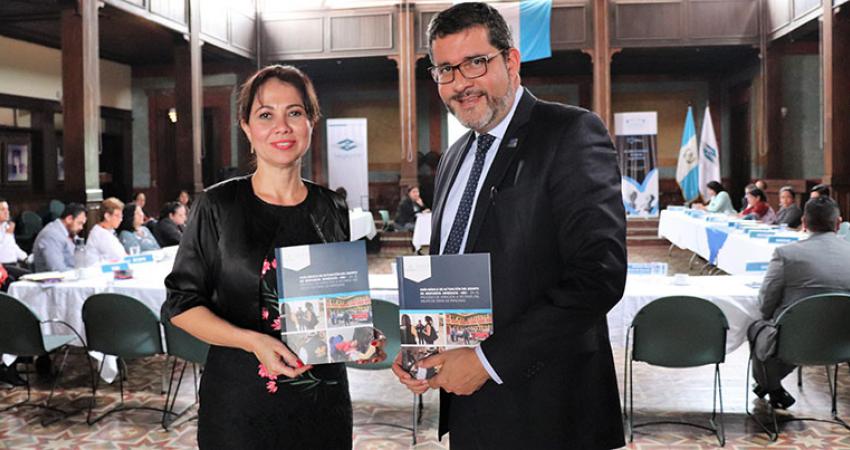Guatemala: new Guidelines for the Immediate Response Team of the Inter-institutional Committee against Trafficking

Guatemala. The United Nations' Organization for Migration (IOM) presented copies of the Guidelines for the Immediate Response Team of the Inter-institutional Committee against Trafficking, with the goal of optimizing government assistance to victims of this crime.
This donation aims to be a tool for government staff involved in providing specialized assistance to potential victims of trafficking in persons, particularly for populations such as children, adolescents, people with disabilities, LGBTI groups, and indigenous peoples.
The official presentation ceremony was led by the head of the Secretariat against Sexual Violence, Exploitation, and Trafficking in Persons (SVET), Claudia Ordóñez, and the Chief of Mission of IOM for El Salvador, Guatemala and Honduras, Jorge Peraza Breedy.
The guidelines will impact the actions of the SVET, Public Ministry (MP), Attorney General (PGN), National Civil Police (PNC), Presidential Secretariat of Social Welfare (SBS), and Ministry of Foreign Affairs, entities that have an action plan for specific situations.
Human trafficking is the enslavement of human beings for different forms of exploitation, such as sexual and labor exploitation. Trafficking occurs when criminals lure and deceive people by means of false offers of studies, travel, and jobs with minimum requirements and promised benefits. These groups look to enslave people in sex work, factories, domestic service, and fishing, among other sectors.
This act contributes to the achievement of the Sustainable Development Goals (SDG), especially SDG 16, which promotes just, peaceful, and inclusive societies, in order to end abuse, exploitation, trafficking, and all forms of violence and torture against children. Likewise, it contributes to the achievement of SDG 8, which calls for immediate and effective measures to eradicate forced labor, put an end to contemporary forms of slavery and human trafficking, protect labor rights, and promote a safe and risk-free work environment for all, including migrants, particularly migrant women and people with unstable employment.
The guides were provided through the IOM's Mesoamerica Program, with the support of the Bureau of Population, Refugees, and Migration of the State Department of the United States of America.
To access the guide, click here.
For more information, contact IOM Guatemala: Melissa Vega, mevega@iom.int; IOM El Salvador, Guatemala, and Honduras, Alba Amaya - aamaya@iom.int